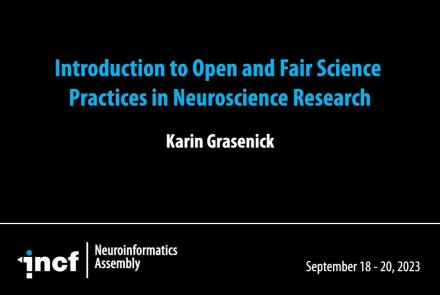This talk discusses the BRAIN Initiative Cell Atlas Network (BICAN), taking a look specifically at how this network approaches the design, development, and maintenance of specimen and sequencing library portals.
Difficulty level: Beginner
Duration: 15:08
Speaker: : GQ Zhang
This final lesson of the course consists of the panel discussion for Streamlining Cross-Platform Data Integration session during the first day of INCF's Neuroinformatics Assembly 2023.
Difficulty level: Beginner
Duration: 50:16
Speaker: :
In this lesson, you will learn about approaches to make the field of neuroscience more open and fair, particularly regarding the integration of equality, diversity, and inclusion (EDI) as guiding principles for team collaboration.
Difficulty level: Beginner
Duration: 14:11
Speaker: : Karin Grasenick
This lesson discusses the topic of credit and contribution in open and FAIR neuroscience, looking through the respective lenses of systems, teams, and people.
Difficulty level: Beginner
Duration: 24:34
Speaker: : Tanya Brown
In this talk, you will hear about the challenges and costs of being FAIR in the many scientific fields, as well as opportunities to transform the ecology of the academic crediting system.
Difficulty level: Beginner
Duration: 14:56
Speaker: : Zefan Zheng
This brief talk describes the challenge of global data sharing and governance, as well as efforts of the the Brain Research International Data Governance & Exchange (BRIDGE) to develop ready-made workflows to share data globally.
Difficulty level: Beginner
Duration: 6:47
Speaker: : Kimberly Ray
This lesson describes the current state of brain-computer interface (BCI) standards, including the present obstacles hindering the forward movement of BCI standardization as well as future steps aimed at solving this problem.
Difficulty level: Beginner
Duration: 15:01
Speaker: : Martijn de Neeling
This talk describes how to use DataLad for your data management and curation techniques when dealing with animal datasets, which often contain several disparate types of data, including MRI, microscopy, histology, electrocorticography, and behavioral measurements.
Difficulty level: Beginner
Duration: 3:35
Speaker: : Aref Kalantari Sarcheshmeh
This lightning talk gives an outline of the DataLad ecosystem for large-scale collaborations, and how DataLad addresses challenges that may arise in such research cooperations.
Difficulty level: Beginner
Duration: 2:54
Speaker: : Michał Szczepanik
This talk gives a brief overview of current efforts to collect and share the Brain Reference Architecture (BRA) data involved in the construction of a whole-brain architecture that assigns functions to major brain organs.
Difficulty level: Beginner
Duration: 4:02
Speaker: : Yoshimasa Tawatsuj
This brief talk covers an analysis technique for multi-band, multi-echo fMRI data, applying a denoising framework which can be used in an automated pipeline.
Difficulty level: Beginner
Duration: 4:45
Speaker: : David Abbott
This lesson is the first part of a three-part series on the development of neuroinformatic infrastructure to ensure compliance with European data privacy standards and laws.
Difficulty level: Beginner
Duration: 1:10:05
Speaker: : Michael Schirner
This is the second of three lectures around current challenges and opportunities facing neuroinformatic infrastructure for handling sensitive data.
Difficulty level: Beginner
Duration: 48:26
Speaker: : Michael Schirner
This lesson gives a quick introduction to the rest of this course, Research Workflows for Collaborative Neuroscience.
Difficulty level: Beginner
Duration: 3:23
Speaker: : Dimitri Yatsenko
This lesson provides an overview of how to conceptualize, design, implement, and maintain neuroscientific pipelines in via the cloud-based computational reproducibility platform Code Ocean.
Difficulty level: Beginner
Duration: 17:01
Speaker: : David Feng
In this workshop talk, you will receive a tour of the Code Ocean ScienceOps Platform, a centralized cloud workspace for all teams.
Difficulty level: Beginner
Duration: 10:24
Speaker: : Frank Zappulla
This lesson provides an overview of how to construct computational pipelines for neurophysiological data using DataJoint.
Difficulty level: Beginner
Duration: 17:37
Speaker: : Dimitri Yatsenko
This talk describes approaches to maintaining integrated workflows and data management schema, taking advantage of the many open source, collaborative platforms already existing.
Difficulty level: Beginner
Duration: 15:15
Speaker: : Erik C. Johnson
This hands-on tutorial walks you through DataJoint platform, highlighting features and schema which can be used to build robost neuroscientific pipelines.
Difficulty level: Beginner
Duration: 26:06
Speaker: : Milagros Marin
This lesson consists of a panel discussion, wrapping up the INCF Neuroinformatics Assembly 2023 workshop Research Workflows for Collaborative Neuroscience.
Difficulty level: Beginner
Duration: 25:33
Speaker: :
Topics
- Artificial Intelligence (6)
- Philosophy of Science (5)
- Provenance (2)
- protein-protein interactions (1)
- Extracellular signaling (1)
- Animal models (6)
- Assembly 2021 (29)
- Brain-hardware interfaces (13)
- (-) Clinical neuroscience (17)
- International Brain Initiative (2)
- Repositories and science gateways (11)
- Resources (6)
- (-)
General neuroscience
(45)
- Neuroscience (9)
- Cognitive Science (7)
- Cell signaling (3)
- Brain networks (4)
- Glia (1)
- Electrophysiology (16)
- Learning and memory (3)
- Neuroanatomy (17)
- Neurobiology (7)
- Neurodegeneration (1)
- Neuroimmunology (1)
- Neural networks (4)
- Neurophysiology (22)
- Neuropharmacology (2)
- Synaptic plasticity (2)
- Visual system (12)
- Phenome (1)
- General neuroinformatics
(15)
- Computational neuroscience (195)
- Statistics (2)
- Computer Science (15)
- (-) Genomics (26)
- Data science
(24)
- Open science (56)
- (-) Project management (7)
- Education (3)
- Publishing (4)
- (-) Neuroethics (37)




















